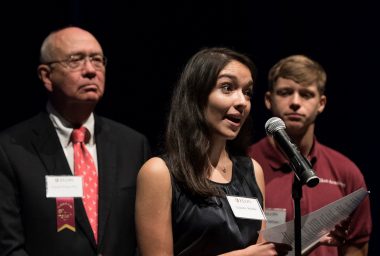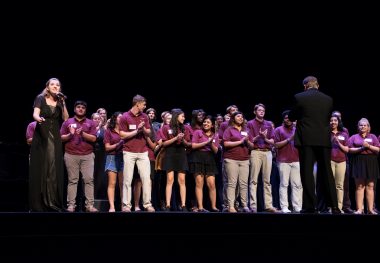Supporters and participants in the Elon Academy celebrated the 10th anniversary of the college access and success program on Thursday, Sept. 15.
Ten years ago, Elon University began reconsidering its role in the Alamance County community and the difference Elon can make in the lives of young scholars for whom college might not be a possibility. The result of that self-examination is the Elon Academy, a college access and success program that has become a national model and has created opportunities for nearly 250 scholars.

“Whether you’re a donor, an advocate, a friend, a mentor, a teacher or a staff member, it is because we have all worked together that the Elon Academy is preparing a new generation of leaders who will change the world,” Elon Academy Director Terry Tomasek said.
One example is Cazandra Rebollar, who said she didn’t think college was a possibility, and didn’t realize that Wake Forest University existed before starting at the Elon Academy in 2010. Now a senior at the Winston-Salem, N.C., university, she plans to pursue a master’s degree with a goal of working in higher education administration.
“The Elon Academy gave me the tools I needed to find my place on a college campus and thrive in that space,” Rebollar told the audience. The “consistent and genuine support” of those at the Elon Academy “has inspired me to create change in my community and be a mentor for those with backgrounds similar to mine.”
The Elon Academy uses a combination of a summer residential program on Elon’s campus and Saturday sessions during the school year to help expose area scholars to a broader range of academic topics while also assisting them with the college planning and application process. The initial scope of the program has expanded to include support for students during their college careers, and the cultivation of an alumni network that can also help younger scholars follow the path to and through college.
Elon President Leo M. Lambert reminded those at the celebration that the spark that led to the creation of the Elon Academy was the threatened closure of an underperforming high school just miles from Elon’s campus. The idea was to create a program that would help provide the right tools and opportunities local students would need to make pursuing a higher education degree possible.
The idea of a college access program required close collaboration with the Alamance-Burlington School System and the support of the broader community. Elon recognized one benefactor in particular on Thursday night — Edna Truitt Noiles, who with her husband, Doug, provided financial support to start up the Elon Academy and propel it forward.
A video presentation celebrated the presentation of the Elon Medallion to Noiles this summer at her Connecticut home. “I want to thank Elon personally for opening up the world to me,” Edna Noiles said in response to receiving the medallion. “Thank you Elon for being the vehicle through which I can open the world for others.” (Read more about the medallion presentation here.)

“Dr. Long has touched the lives of scores of young scholars and their families, and on this 10th anniversary, we honor her for her commitment to the academy and Alamance County, for her steadfast and undying drive, and for her deep love for every one of these scholars,” Lambert said, before presenting Long with a gift made by the scholars.
Obviously touched, Long stepped forward to say to those enrolled and involved in the academy that “you gave us the gift of imagining possibilities we had never considered before.”
Consider The Elon Academy’s record through its first 10 years:
- 35 Elon Academy scholars have graduated from college, 82 are currently enrolled at 25 college campuses and 145 scholars have completed the high school portion of the program.
- 100 percent of Elon Academy scholars who have completed the high school phase of the program have been accepted to college
- The most recent class to complete the high school portion was offered $2.3 million in merit-based aid from colleges and universities — a new record.
 Bailey McCann, a senior at Graham High School, heaped praise upon the “cheerleaders behind me every step I took” — that team of Elon faculty and staff, as well as Elon student mentors, who have supported him as he works to become the first in his family to go to college.
Bailey McCann, a senior at Graham High School, heaped praise upon the “cheerleaders behind me every step I took” — that team of Elon faculty and staff, as well as Elon student mentors, who have supported him as he works to become the first in his family to go to college.
“Many people have either donated their money or volunteered their time to this program,” McCann said. “I remember thinking, ‘why would someone want to spend their money and time on me?’ I got a simple answer – ‘because we believe in you.'”
Among those who have provided steadfast financial support to the program is Russell Wilson, who took the stage Thursday night after hearing the testimonies of current and past Elon Academy scholars. When he and his wife, Rosella, first heard about the Elon Academy, they knew they had to support the program, and have contributed each year since.
“Now that you know what you’re getting for your money, everybody out there needs to take it upon themselves to contribute,” Wilson said.
The Elon Academy has become just one effort at Elon to help students gain better access to a college degree and succeed while on campus, said Jean Rattigan-Rohr, executive director of community partnerships and director of Elon’s Center for Access & Success.
“The goal is that we might learn from, lean on and inspire each other as we bring our united voices to the complex issue of access to empowering education for traditionally underrepresented students,” Rattigan-Rohr said.


